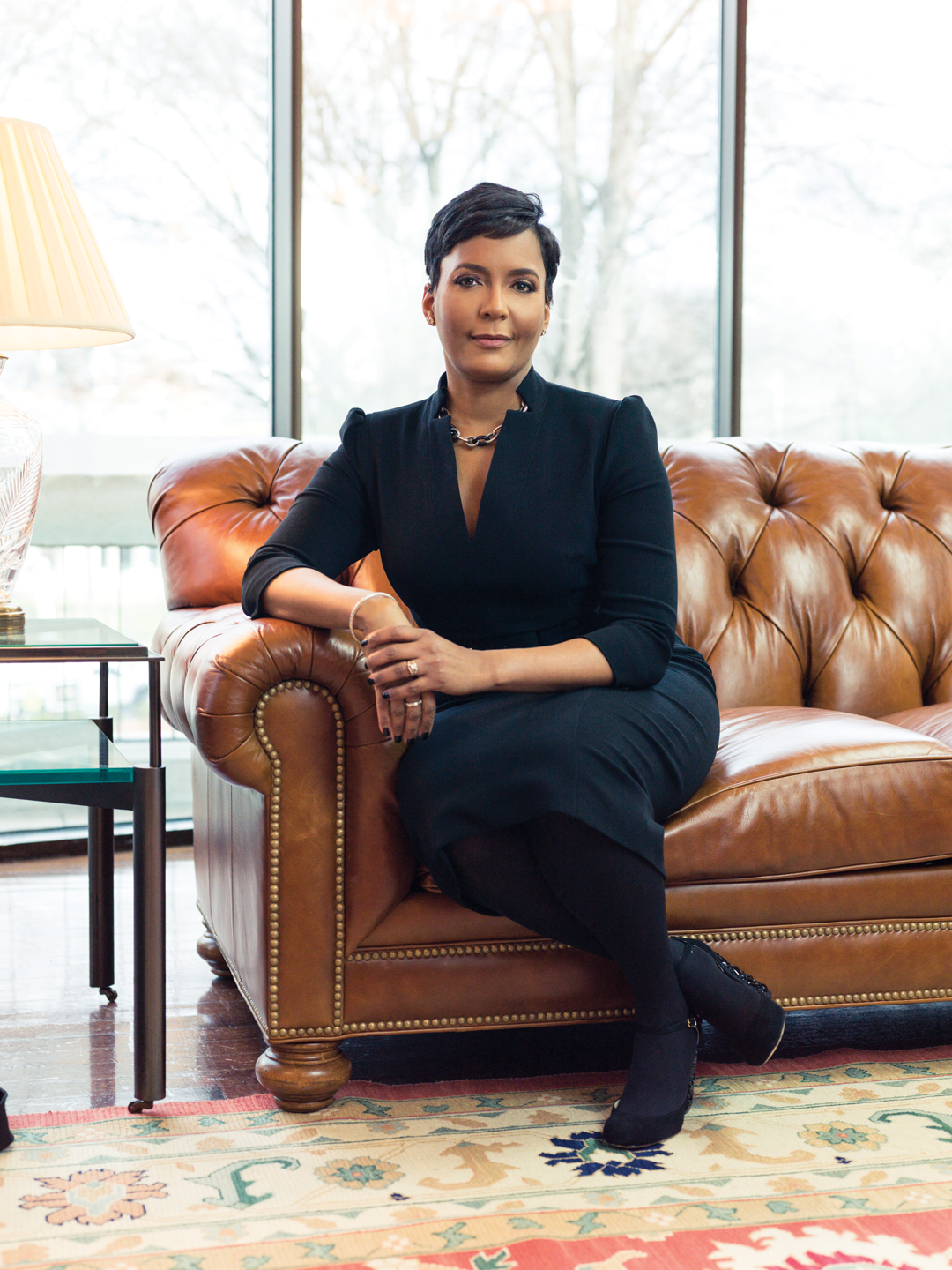
Photograph by Darnell Wilburn
Fourteen days after she took office, Mayor Keisha Lance Bottoms announced that she and Meria Carstarphen, the superintendent of Atlanta Public Schools, had reached an agreement where the city would transfer dozens of APS land deeds to the school district. Normally, this would not be newsworthy. But the transfer had stalled under Bottoms’s predecessor, Kasim Reed, who argued that APS did not have plans to ensure that conversions of old school buildings into housing included affordable units.
The announcement was a political win for Bottoms, who had been badgered on the campaign trail by predictions that her administration would be little more than an extension of the previous. Reed, whose final months in office were clouded both by the ongoing federal investigation into corruption at City Hall and a growing fatigue with his autocratic style, had endorsed then councilwoman Bottoms and, in the weeks leading up to the runoff, had focused his efforts on bringing out national Democrats to stump for her.
Bottoms’s margin of victory was almost as thin as Reed’s eight years before—and, as it turned out, against the same opponent, Mary Norwood. The 2017 results reminded us that in Atlanta, identity politics still play a decisive role in city elections. Six weeks into her term, Bottoms spoke to Atlanta magazine executive editor Steve Fennessy about the election, her efforts to raise $1 billion for affordable housing, whether she’ll endorse in the governor’s race, and the sexism she encounters as a woman who, besides being a mother of four, is the mayor of Georgia’s largest city.
What’s been the biggest surprise for you coming into office that maybe you weren’t anticipating?
Probably the biggest change is being able to sit still because I’ve been on the go. I’ve felt like I’ve had on roller skates even before the election began. The other big surprise has been my comfort level in this transition. It’s uncomfortable because it’s new, but not nearly as uncomfortable as I thought it would be. I thought it would take me a lot longer to be confident in the job, because it’s really big and it’s new. It’s not to say that I still don’t have a ways to go, but I’m a lot more firm and solid than I expected to be.
So it’s revealed things about yourself that maybe you hadn’t anticipated or seen?
In many ways, yes. Sitting in the seat of mayor is very different than being a councilperson. The councilperson has an extremely important job, but you also have the luxury of doing a lot of Monday morning quarterbacking. Sitting in this seat really is about leading in every single way and not just responding. There’s so much to respond to on any given day, while making sure that our priorities remain top of mind.
What are those priorities?
The big priority the first few weeks in office was pushing through cash bail bond legislation. Now, we’re dealing with the APS deeds and making sure we get those transferred. The overarching priorities remain affordability and equity, and education and crime. [There are] conversations we’re having at the state surrounding transit, jobs, and economic development.
You’ve said you want to raise $1 billion for affordable housing. How do you do that?
My goal is $500 million from the public sector and $500 million from the private sector. So much work is going on with different entities across the city, with nonprofits, with the public sector, but we’re not tracking that and working together collectively. This is an opportunity for us to all sit around the table and talk about where we are and where we need to go collectively.
When it comes to raising $500 million from the private sector, what’s the pitch?
I just got back from San Francisco. The top conversation is how unaffordable San Francisco is and how it’s impacting people’s lives. The example they gave is an average two-bedroom, I believe, is $1.3 million. They were able to measure within “x” number of years how long it’s been since a working-class family could afford to live in San Francisco. It was stunning. The pitch is, “Don’t let Atlanta become San Francisco. Don’t let Atlanta become New York.” We still have an opportunity to stop it because we can look at these other cities and see what the pitfalls are.
You have so many people talking about it who, on the surface, you wouldn’t think care, but they do. You have people who may be able to afford to live in the city. It may be the CEO of a company, but their son’s second-grade teacher can’t afford to live in the city. They’re driving in from Paulding County, so that CEO cares. Or maybe someone who owns a business who’s having trouble staffing their cashier position because [the potential employees] don’t have transportation and can’t afford to live in the city. Everybody is talking about it. Everybody cares. Now, we just have to collectively do something about it.
The affordability piece is a part of it, but so, obviously, is the equity piece. Again, I think it’s about giving people a reason to care. When you talk about income inequality and then you connect it to crime rates or any number of other things, then that makes people pay attention and want to do something about it.

Photograph by Darnell Wilburn
There’s housing displacement, and then there’s cultural displacement. Atlanta’s identity is so tethered to its black culture. Looking at development along the BeltLine, what are the tools at your disposal to preserve the essence of those neighborhoods?
It really is about education at a very basic level. My grandparents’ home is a block from the Westside Trail. They passed 20 years ago. My mother and her brothers have a home. Their children have homes. But nobody is thinking about this family home outside of a structure. So, I think it’s about educating people like my family and legacy families in these neighborhoods about what this structure means to the place and space in Atlanta. “This is the BeltLine. This is why you should care. This is why this family home is still important. This is why you shouldn’t sell it to the highest bidder.”
What I’ve found is that we begin these conversations at a very high level. If there’s a book with 10 chapters, we begin the conversations as if people have read chapters one through five. I can’t tell you how many times I’ve gone into community meetings, and if I’ll say, “How many of you have heard of the BeltLine?” maybe 40 percent will raise their hands. “How many of you have been on the BeltLine?” Maybe 10 percent. There’s this assumption that everybody knows what it is and everybody appreciates it’s for them too, but they don’t know. We have to educate people, especially our legacy residents. “This is this cool, innovative, transformative project coming through your neighborhood. What is it? Why does it matter to you?”
A few years ago, I was speaking at the [Andrew & Walter] Young Family YMCA [in southwest Atlanta] to some teenagers. None of them had heard of the BeltLine, much less been on it. So, we took a field trip. To see the looks on these kids’ faces running down the BeltLine, it was as if I had taken them to Six Flags. I think, unfortunately in many neighborhoods, especially in African American communities, the thought of walking through a wooded trail is counterintuitive to safety. It may cut through your backyard, but who walks through the woods? It’s not something that happens in African American communities. So, it’s about education.
That education will solidify their connection to their home?
Absolutely. When someone comes through, and the family home has been paid off for the past 30 years, and they offer $50,000 in cash, you see that it’s worth a whole lot more than that, and it’s about something more than that.
What do you tell your kids about your job?
It’s more about what they tell me. I went to put something at the door last night so I would see it when I walked out the door. One of my kids said, “Bye, Mommy,” and I said, “I’m not going anywhere.” They all have very different perspectives. My seven-year-old son, who’s very thoughtful, came to me one day and said, “I’m so proud of you. You worked hard, and it was a tough race, and you did your best, and you won. You get a chance to make a difference.” For my younger kids, it is their entire life. My [seven-year-old] twins—all they’ve known is me as an elected official. I have a nine-year-old and a 15-year-old. My 15-year-old really is the only one who knows a different life. I think for them, they just adapt.
You’re mayor of the city of Atlanta. Your predecessor was single and didn’t have kids for a large part of his eight years in office. Is that a challenge?
I was laughing with one of the guys on the security detail. I said, “Gosh, up until January 2, I was the sole logistics director for this whole family organization, and I wonder how I did it every day.” I think we just stretch to the level of wherever we need to be. In that regard, there are a lot of women who do this all day, every day, and a lot of women who do it without any help from a husband, or a dad, or extended family. I am extremely fortunate that I have all of that. I have a great husband, I have a wonderful, energetic mother, got folk that I can call up when I’m in need. I’m fortunate. It takes a village, and I’ve been calling on my village a lot.
Voters in 2016 approved a one-penny sales tax increase that will fund $300 million in transit improvements over five years, in addition to $2.5 billion over 40 years for MARTA. What would you like to see tackled first?
Long-term, I am a big proponent of extension of some type of light rail throughout the city—whether it’s light rail, autonomous, whatever it may be, high rapid bus transit—some extension so that there is true connectivity throughout the city, so that people aren’t waiting at a bus stop for an hour in the dark for a bus to come.
I had a meeting this week where we talked about the bus rapid transit system. That’s a lot less expensive than light rail but accomplishes the same thing. I think you’ll start seeing things coming online within the next year or two [in areas around Turner Field]. Then, there’ll be a natural progression to extension in other places throughout the city. I think you will also begin to see this desire for other counties in the region not to be left out because it’s impacting their bottom line. There’s a reason Atlanta is attracting businesses, because although our MARTA system may not be ideal, it sure is better than Cobb and Gwinnett, and any number of other counties. I think what they’re starting to feel is they’re not true competitors because they don’t have the transit piece.
Certainly there was a productive relationship between Mayor Reed and Governor Nathan Deal. We’re electing a new governor this fall. Do you plan to endorse in the Democratic primary?
Once the Legislature gets out of session, that whole conversation will heat up. I suspect that I will [endorse] before the primary.
What will it take to elect a Democrat to the governor’s office?
I think that there has to be more meaningful voter registration throughout the state and not just the rhetoric of voter registration. There has to be real work done.
In an interview with Politico, you were asked about Mayor Reed and the pressures you felt on the campaign trail. You said, “There were a lot of critiques and criticisms toward me that just would not have been thrown towards a man. ‘Will she be her own person? Can she lead? Will she be a puppet?’ Things that I know are never asked of men or weren’t asked during this race.” You also said that you hadn’t dealt with as much sexism in your entire career as you had on the campaign trail.
I’ve grown up in Atlanta, and I just don’t recall there ever being a question asked of Kasim Reed during his run for mayor if he would be a puppet of Shirley Franklin, and how much influence Shirley Franklin would have on him. I think a lot of that was asked of me because I am a woman. There is this assumption: “Surely you can’t be smart, and you can’t be attractive, and you can’t be accomplished without it being because of something.” Men don’t have to explain themselves in that way. Pick a name. Barack Obama, Bill Clinton, George Bush, any number of men have never felt the need to offer an explanation as to who they are and why they are.
I was always aware of race growing up in Atlanta but never so much of being a woman and all that entailed professionally until I entered public office, and having questions asked like, “You’re a mother. How can you be mayor?” I would be shocked if any man in the race were asked, “You’re a dad. How can you be mayor?” Quite often, those questions were asked by women, which was interesting.
Toward the end of his term, Mayor Reed said he was ready to leave. He said that the talk about him trying to maintain a level of influence was not going to be borne out by reality. But as somebody who’s new to this job, it’s also understandable that you’d want to talk to your predecessor. What communications have you had with the former mayor?
Actually, very limited communications. There have been some natural things that I’ve reached out to him and asked. “Hey, I understand you were working on ‘XYZ.’ Give me a little background on that.” He has been, I would say, very mindful of not interfering. He’s even said that to me. He’s available if I have a question, as all of the other previous mayors have offered themselves up as well. He’s one of any number of folk, if I need some guidance, I’d pick up the phone and ask.
What specifically can you do, or do you plan to do, to reform the procurement process to make it more transparent, to make it less prone to corruption?
We are launching our search for a new procurement head, along with several other searches in the city. As mayor, you’re signing multimillion dollar contracts with very limited information. You get a contract, and you sign it. My concern is, I don’t want to know a whole lot about how this vendor was selected, but if I’m ever called to explain why the vendor was selected, I also don’t have a lot of information. I need a recommendation from these folk looking at procurement on how to toe that line. You can’t have so much information that it appears that you will be influenced or trying to influence, but you also need to be confident in what you are signing off on, that you’re not signing contracts blindly.
Can you talk about the election and the racial divide that the results revealed?
What I learned is that there’s still an enormous amount of racial distrust in this city. The divide is much more glaring than I thought it would be. Part of it was that it was such a negative campaign. There were so many narratives that were put out there that I think really are typical of narratives put out on African American elected officials: “You’re all corrupt. You’re all unethical.”—these stereotypes. I was not expecting that in Atlanta. I especially wasn’t expecting it as it relates to me. I guess putting it out there was not as surprising to me as the fact that so many people bought into it. I think you look at the election map, and you see how it bore out.
We anticipate creating some type of citywide program to further this conversation because I don’t think it’s a productive conversation in the heat of battle. Again, I think it’s [about] getting people to care and engage when it’s not election time. We clearly still have a very long way to go in this city. Some people would say I was probably naive to be surprised about it, but it was still shocking to me in Atlanta. I thought that we were way beyond that. The election highlighted to me that we’re not. The wonderful thing: I’ve had probably more white people in the city ask me to make sure [this conversation] happens than African Americans. That’s very encouraging.
This article appears in our April 2018 issue.










![The North Carolina Museum of Natural Sciences’ newest exhibit is a [pre]historic first](https://cdn2.atlantamagazine.com/wp-content/uploads/sites/4/2024/04/DD-3-100x70.jpg)



